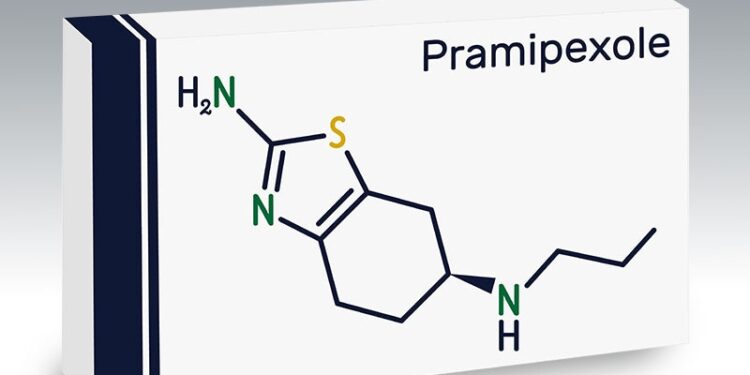TOPLINE:
Augmenting antidepressant treatment with pramipexole led to a significant reduction in symptoms relative to placebo in treatment-resistant major depressive disorder (MDD) at 12 weeks, a trial found. The benefits persisted over 48 weeks despite side effects, highlighting the clinical utility of pramipexole in this patient population.
METHODOLOGY:
- This double-blind, placebo-controlled randomised trial conducted across nine centres in England included 151 adults (mean age, 44.9 years; 56% women) with MDD who did not respond to two or more previous antidepressant treatments.
- Individuals taking antipsychotics and those with a history of psychosis, bipolar disorder, or clinically significant current or previous impulse control difficulties were excluded.
- Participants were randomly assigned to receive either pramipexole (titrated to 2.5 mg; n = 76) or placebo (n = 75) added to their ongoing antidepressant medication over 48 weeks.
- In the intention-to-treat analysis, the primary outcome was any change in the 16-item Quick Inventory of Depressive Symptomatology self-report version (QIDS-SR16) score at week 12 from baseline.
- Secondary outcomes included a change in QIDS-SR16 scores at 48 weeks, response and remission at 12 weeks, and adverse events. Treatment acceptability was measured using the 9-item Treatment Satisfaction Questionnaire for Medication (TSQM-9).
TAKEAWAY:
- The mean reduction in the QIDS-SR16 score from baseline to week 12 was higher with pramipexole than with placebo (mean reduction in score, 6.4 vs 2.4; P < .0001).
- Response rates at week 12 were significantly higher with pramipexole than with placebo (44.1% vs 16.4%; relative risk [RR], 2.72; P = .0011). Similarly, remission rates at week 12 were higher with pramipexole than with placebo (27.9% vs 7.5%; RR, 3.94; P = .0026).
- Treatment satisfaction at 48 weeks was significantly higher in the pramipexole group than in the placebo group (mean difference in the TSQM-9 score, 26.41; P < .0001).
- Discontinuation due to side effects was greater in the pramipexole group than in the placebo group (20% vs 5%; adjusted incidence rate ratio for adverse events, 2.24; P < .0001).
IN PRACTICE:
“In this trial involving participants with treatment-resistant depression, pramipexole augmentation of antidepressant treatment, at a target dose of 2.5 mg, demonstrated a reduction in symptoms relative to placebo at 12 weeks but was associated with some adverse effects,” the authors wrote.
“These results suggest that pramipexole is a clinically effective option for reducing symptoms in patients with treatment-resistant depression,” they added.
SOURCE:
This study was led by Michael Browning, DPhil, University of Oxford, Oxford, England. It was published online on June 29 in The Lancet Psychiatry.
LIMITATIONS:
Functional unmasking occurred during the study, potentially leading to expectancy effects. Additionally, ethnicity data were not collected, limiting the ability to determine the representativeness of the study population across different ethnic groups.
DISCLOSURES:
This study was supported through the Efficacy and Mechanism Evaluation Programme of the National Institute for Health and Care Research. Several authors reported having financial ties with various organisations, pharmaceutical companies, and research councils, with some being employed previously or holding shares in industry. Details are provided in the original article.
This article was created using several editorial tools, including AI, as part of the process. Human editors reviewed this content before publication.
Source link : https://www.medscape.com/viewarticle/pramipexole-augmentation-benefits-resistant-depression-2025a1000hlj?src=rss
Author :
Publish date : 2025-07-04 12:00:00
Copyright for syndicated content belongs to the linked Source.



